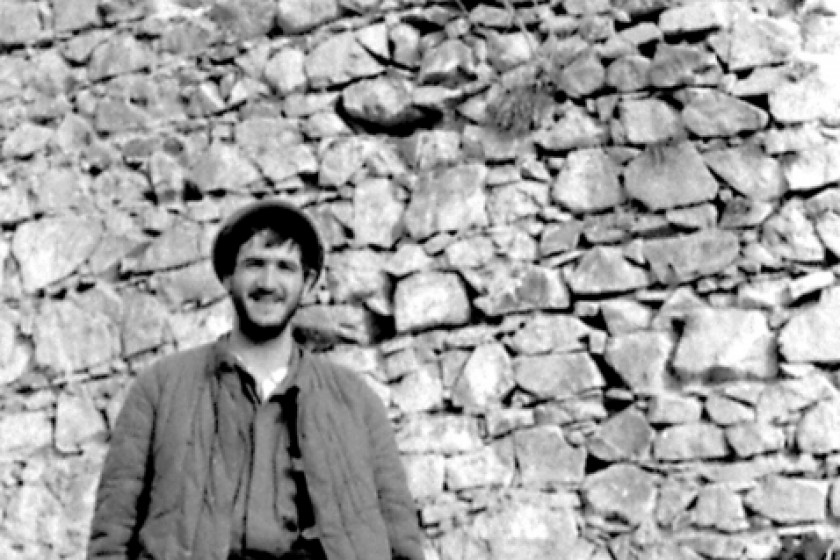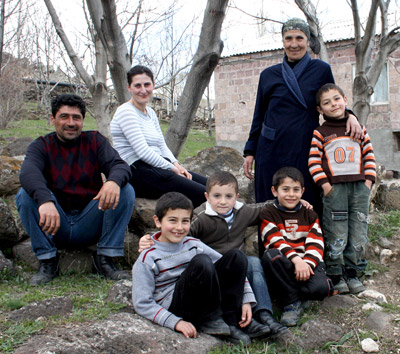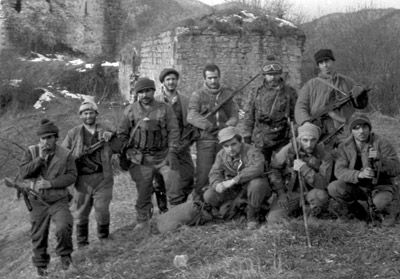
Mother of Dead Artsakh Soldier – “Never Forsake Karabakh”
We don’t say that they died, we say, they fell. Everything is preserved in our memory; down to the last detail. The boys are gathered around the gravestones; in silence. The silence captures all. The guys were silently standing by the graves. We were obliged to stand next to them in silence and listen; listen to those who gave their lives for the country. Listen to their silence and never, ever, take advantage of it.
Vahe was born in the village of Kaqavadzor, in the Talin district. He was a student at the Medical Institute. He participated in many battles. After the fall of Shaoumyan he continued the fight in the surrounding forests. On July 13, 1993, Vahe, who was leading a reconnoitering unit, was killed in the village of Mataghis. Vahe’s mother, Svetlana Manoukyan, bent over from grief when they were lowering her 21 year-old son’s body into the ground, slowly whispered – People, never say Karabakh be damned! Before leaving for the war, Vahe kissed me and said that he was going to the front and that if anything happened to him we should bury him in our yard. He also told me don’t to make a fuss if anything happened to him, that I shouldn’t start to wail and pull out my hair like other moms and that I shouldn’t debase myself in such a way. I took the news of Vahe’s death quite stoically. The only thing that I did was to cut some of my long, flowing hair and place it at his feet. I didn’t leave the house from 1991 till 2001; until the birth of my grandson Vahe. I also wore a black head scarf. But when my grandson was born I replaced it with a floral one,” recounts Svetlana Manoukyan.

She worked at the Kaqavadzor school for 32 years. After the death of Vahe, she never set foot in the classroom again; she just couldn’t. “After his death, I never went back to work. I taught language and literature. I’ve worked as an instructor and a principal. On the Monday that he was killed, I went to school, not knowing what had happened. During the night that next day they brought his body. I never went back to the school. I couldn’t let the kids see me like that; wearing all black and in grief. When I taught, I left my personal life outside the school doors. But my son’s death was such a heavy burden for me to bear that it was imposible to return afterwards. Everyone came to consol me; the teachers, principal, president of the village council. Given my condition, I didn’t want to influence the kids of other parents by my appearance and attitude. The children used to always see me with a smile on my face,” says Vahe’s mother. The mother went on for hours; remembering all the little details and comparing the characters of her two sons. She lives with her eldest son Hayk, his wife and two kids. Vahe was three years younger than Hayk. They left for the war in Karabakh separately. Vahe was only sixteen when he was accepted at the Medical Institute, the youngest in the class.

“Vahe had a much calmer demeanor than his brother Hayk, who would speak his mind and act quite impulsively. Vahe, on the other hand, would toil away silently at the task before him. The two went to a school in Talin that concentrated on mathematics but Vahe wasn’t as good in math as his brother. By the time Vahe had solved a math or physics problem, Hayk had already burned through fifty. Hayk was a bit of a romantic. So when the robotics department opened up in the poly-techical institute he said he would apply there and I agreed with his decision. But he always wanted to go into medicine. He was accepted with top marks and switched over to a correspondence course when he went to Karabakh. He graduated but Vahe still had two exams to pass. Shahen Meghryan would say that if there were drafting a project, if six people were saying the same thing, and if Vahe said something else, they’d follow what Vahe said. Vahe was able to assume the responsibility for another person’s life on his shoulders. but Hayk was the wiser one who understood more. He just couldn’t cope with being responsible for someone else or the thought that another person might suffer due to his actions. Hayk had a rock solid personality. Even today, he’ll tell someone right to their face that they are wrong. It doesn’t matter if it’s Serzh or whomever. Vahe was different. He’d maneuver around the person without arguing. But in the end, Vahe would do what he saw best,” said Mrs. Manoukyan. On May 6, 1994, Vahe Baghdasaryan was posthumously awarded the Military Cross, 3rd Degree, by the NKR Supreme Council, and the Shushi Liberation Medal. 
Hayk doesn’t like to speak about the war years and it’s hard to get him to open up and talk, especially when the conversation turns to his brother. Their mother says the brothers were very close; like two morning doves. “When the villagers brought his body back home they’d deride Karabakh, saying ‘Karabakh be damned’. I would reprimand them for such talk. When they came to console me, I would get angry whenever they uttered an unkind word towards Karabakh. I couldn’t take it when they said ‘they went and fought for nothing’. I can’t stomach such talk,” says Vahe’s mother, Svetlana Manoukyan.


Photos by Hakob Poghosyan
 Videos
Videos Photos
Photos




Write a comment